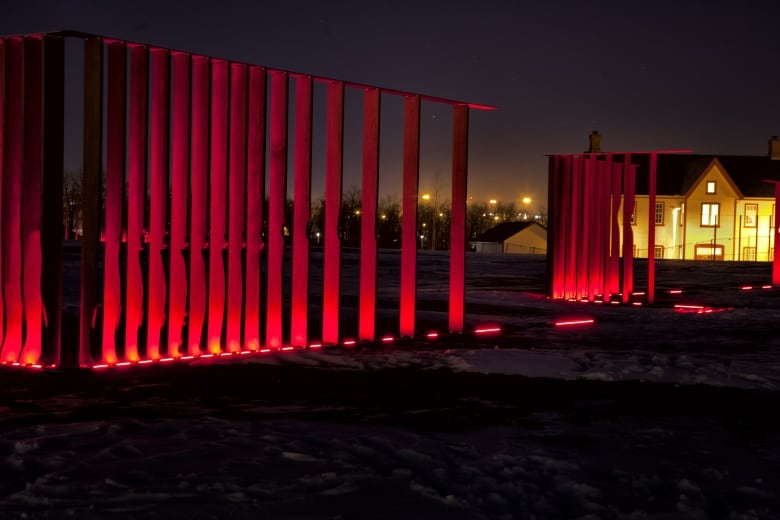Fort Calgary art installation evokes outlines of original fort
New art project at Fort Calgary gives historic fort new face and form

Ever visited Fort Calgary? Plenty of things to see but something's missing. The fort.
The original 1875 North West Mounted Police palisade at the confluence of the Bow and Elbow is long gone. Those wooden walls lasted only six or seven years.

"But wait" you say. "What about those buildings you see when you drive by?"
Those are a mix of recreated barracks and the interpretive centre. Not original.
But now, on the spot of the original fort, there's a new art installation that outlines the exact dimensions of our city's origin point.
A different kind of wall.

It's called Marking — created by Vancouver-based artist Jill Anholt.
Made of wood, carved images and lights, it is a symbolic interpretation of our past.
Vertical wood slats reveal the outline of the original fort and show where its gates were located. It's not really a square, given the lookouts which bulged at each of the four corners.
The boards — which are the same height as the old fort walls — are topped with metal. In the wood and visible at just the right angle, there are shapes of 12 standing figures.
"The carvings in the vertical elements are symbolic of all of our people and the ages who have come to Calgary and will continue to come here," Fort Calgary's president and CEO Sara Gruetzner said.
On her website, the artist states the figures represent this place where different people came together, "to envision a new beginning."

At night, Marking is lit in red light — which shines upwards from the ground so brightly that the shape can been seen from passing airplanes. This is an homage to the red serge jackets worn by the original NWMP officers.
Anholt says she hopes her piece is evocative of the transiency of memory and time.
The 'gates' in the piece are open. This too is highly symbolic.
Back in the NWMP days, aboriginal people weren't allowed to go inside the fort. Gruetzner says they wanted to show that unlike the original structure, this one is open to all.
Right now, the new structure is actually closed off by fences to give the grass time to grow back after the construction. But soon they'll be removed and we will be able to wander between the sections of new wall.
As Gruetzner says, what the folks at Fort Calgary hope to do is "pique people's curiosity and create a sense of wonder of what this place is."
Calgary at a Crossroads is CBC Calgary's special focus on life in our city during the downturn. A look at Calgary's culture, identity and what it means to be Calgarian. Read more stories from the series at Calgary at a Crossroads.
